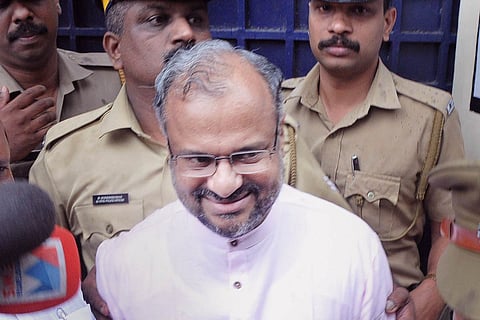

The 50-year-old Kerala nun, who shook the Catholic establishment four years ago when she accused Bishop Franco Mulakkal of rape, was just 15 when she took a vow of celibacy and entered a seminary. It was an unlikely act of rebellion from a woman who was raised to respect authority. She paid a heavy price for breaking formation. Not only was she shunned by the church, supporters of the powerful priest unleashed a barrage of threats and slander against her.
A lower court in Kottayam is expected to pronounce a verdict on January 14, Friday. If found guilty, Franco could become the first catholic bishop to be convicted of rape in India. UPDATE: Bishop Franco Mulakkal acquitted in rape case by Kerala court
In June 2018, Bishop Franco was the head of the Jalandar diocese in Punjab when the nun accused him of raping her 13 times between 2014 and 2016. The Bishop’s legal team, which requested that the proceedings be held behind closed doors to protect his reputation, fired the first salvo by questioning the delay in filing the complaint. According to the prosecution, they questioned the legitimacy of the complaint saying it should have been filed immediately after the alleged incident.
During the course of the trial, it wasn’t merely enough for the nun to prove that she was raped. It also became important for her lawyers to impress upon the court the extraordinary effort it took for the woman to speak out against an institution she was trained to obey without question or doubt for more than 30 years.
Prior to the commencement of the trial in late 2020, there were brazen attempts to manipulate the case and weaken the survivor’s resolve. There were videos and social media posts vilifying the nun and her small circle of supporters, including Sister Alphy Pallasseril, Sister Anupama Kelamangalathuveliyil, Sister Josephine Villoonnickal, and Sister Ancitta Urumbil. The humiliating material was also used by the Bishop’s lawyers in court. And outside court, the pressure kept building with the nuns being evicted from the Kuravilangad convent in January 2019. But the sisterhood somehow held on to ensure the case didn't go weak.
“The entire attempt was made to look at the sexual assault survivor in a cold and mechanical manner. There was a consistent effort to psychologically put her down,” Sandhya Raju, a lawyer who assisted the prosecution told TNM.
The prosecution said it significantly focussed on how rigidly the church works and how difficult it is for the female clergy to speak out. The first person that the survivor confessed her ordeal to was another nun — Sister Lissy Vadakkel — who was her counsellor too. Their first instinct was to turn to prayers, and it was only later that the survivor gathered the courage to approach higher authorities with a complaint. For months, she knocked on several doors, including that of the Vatican. Without receiving any support, she went to the police. The nun wrote to the Ambassador of the Pope in September 2018, “From childhood we have been taught to believe that the Church is our mother. But in the light of my experience I am beginning to think that the Church is a stepmother to women and laity.”
The construct of the Christian canonical laws has often been criticised for being innately undemocratic and patriarchal, often taking away from women their agency, be it for abortion or property inheritance.
Within the Church, too, while both nuns and bishops take the vow of celibacy, the men are not required to take the vow of poverty (waiving off their right to own property, for example). The Church chastised and threatened a nun with expulsion for learning how to drive a car, publishing poems, wearing salwar and even taking part in protest against the Bishop without seeking permission from her superior.
Within Christian community, too, women are frequently trained not to question the functioning of the church. Many nuns are even unaware that religious institutions constitute a workplace and that they are protected by workplace sexual harassment laws.
It was into such an immutable framework that the survivor-nun came to the convent at the age of 15, in the 1980s, vowing to follow an ascetic life of obedience, chastity and poverty.
For a woman, who has been embedded in the system since then, to talk about the sexual assault and pursue legal recourse against a bishop, is a life-altering decision. It was the police inaction and threats against her family that prompted the survivor to go public with her allegations against the bishop.
"Even when she merely says the bishop has troubled or harassed her, those words are heavy with traumatic details for the survivor. For an outsider, on the other hand, the mere mention of harassment does not detail the assault she went through,” the prosecution said.
Unlike many women with the means to connect to a wide network for support, nuns either have no such support system or a smaller system that is restricted to the convent, especially when they stand up against an authoritative figure. They are forced to continue to live in the same hostile environment of abuse and ostracisation, like the survivor-nun. She has been surviving in the same convent because of the support of other nuns, said her counsel.
If the judgment is in the nun’s favour, the question still remains, will the Church continue to be hostile towards the survivor or rethink its approach towards women who report the abuse of power within the system. This is where the judgment on Friday holds salience.